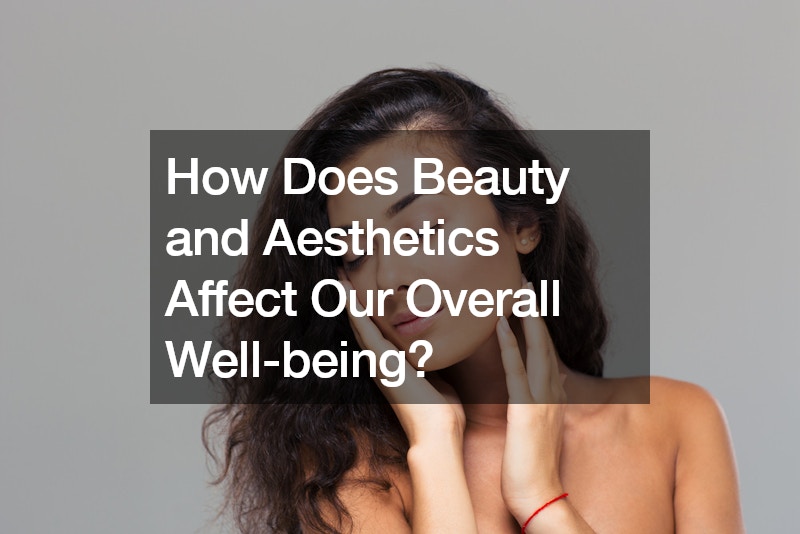In a world inundated with functionality and efficiency, the significance of aesthetics and beauty often takes a backseat in our daily lives. However, beneath the surface, the way our surroundings look and feel plays a profound role in shaping our overall well-being. From the natural world to man-made environments, aesthetics and beauty exert a powerful influence on our emotions, behavior, and even physical health.
The Evolutionary Roots of Beauty
Beauty is not merely a subjective concept; it has deep evolutionary roots that trace back millions of years. Early humans, like their predecessors, relied on visual cues to navigate their environment and ensure survival.
Patterns such as the golden ratio, symmetry, and fractals, prevalent in nature, helped our ancestors assess their surroundings for safety and resources. These patterns became ingrained in our biology, shaping our preferences and responses to beauty.
The Psychological Impact of Aesthetics
Our perception of aesthetics and beauty goes beyond mere visual appeal; it profoundly affects our psychological well-being. Research has shown that exposure to aesthetically pleasing environments can have a positive impact on mood, cognitive function, and behavior. Individuals surrounded by beautiful landscapes, artwork, or architecture report lower stress levels, enhanced creativity, and improved focus. Moreover, beauty meets a fundamental human need for meaningful information, contributing to a sense of fulfillment and satisfaction.
Aesthetics in Healthcare Settings
The influence of aesthetics extends into healthcare settings, where it plays a crucial role in patient well-being and recovery. Studies have demonstrated that hospitals and clinics designed with attention to aesthetics can lead to faster healing, reduced pain perception, and overall patient satisfaction. Visual art, soothing colors, and comfortable surroundings create a healing environment that promotes relaxation and facilitates the healing process. Furthermore, beauty in healthcare spaces has been linked to improved staff morale and productivity, fostering a positive work environment.
Urban Aesthetics and Happiness
The aesthetics of our urban environments also significantly impact our overall happiness and quality of life. Cities designed with consideration for aesthetics, such as green spaces, architectural landmarks, and pedestrian-friendly streets, contribute to residents’ well-being. Studies have found that individuals living in aesthetically pleasing cities report higher levels of happiness and life satisfaction. Beauty in urban design enhances social cohesion, encourages outdoor activity, and fosters a sense of community pride.
Integrating Beauty into Daily Life
Recognizing the importance of aesthetics and beauty in promoting well-being, there is a growing movement to integrate beauty into various aspects of daily life. From urban planning and architecture to interior design and public art installations, efforts are underway to create environments that prioritize aesthetics alongside functionality. By prioritizing beauty in our surroundings, we can enhance our overall quality of life, foster emotional resilience, and create spaces that inspire and uplift the human spirit.
Beauty and Mental Health
The connection between aesthetics and mental health is a fascinating area of study, revealing the profound impact that beauty can have on our psychological well-being. Exposure to aesthetically pleasing stimuli, whether in the form of natural landscapes, artwork, or architectural design, has been shown to have significant benefits for mental health.
One way in which beauty influences mental health is through stress reduction. Research has demonstrated that spending time in natural environments, such as parks or gardens, can lower levels of cortisol, the stress hormone, and promote feelings of relaxation and calm. Similarly, exposure to visually appealing artwork or interior design elements can have a soothing effect on the mind, helping to alleviate stress and anxiety.
Moreover, aesthetics and beauty play a crucial role in enhancing mood and emotional well-being. Surrounding ourselves with aesthetically pleasing environments can evoke positive emotions such as joy, awe, and inspiration. For example, a breathtaking sunset or a beautiful piece of music can uplift our spirits and improve our overall mood. This positive emotional state can contribute to resilience, helping individuals cope better with life’s challenges and setbacks.
In addition to stress reduction and mood enhancement, beauty can also foster a sense of connection and belonging. Natural landscapes, in particular, have been found to evoke feelings of awe and interconnectedness with the world around us, promoting a sense of belonging to something greater than ourselves. Similarly, shared experiences of beauty, such as visiting art galleries or enjoying scenic vistas with others, can strengthen social bonds and foster a sense of community.
Furthermore, exposure to beauty can stimulate creativity and cognitive function, leading to improvements in problem-solving abilities and cognitive flexibility. Studies have shown that engaging with aesthetically pleasing stimuli can enhance cognitive performance and promote divergent thinking, allowing individuals to generate innovative solutions to complex problems.
Overall, the relationship between aesthetics and mental health underscores the importance of incorporating beauty into our daily lives. By seeking out and appreciating beauty in our surroundings, we can nurture our mental well-being and cultivate a greater sense of vitality and resilience.
Conclusion
In conclusion, aesthetics and beauty play a crucial role in shaping our overall well-being. From our evolutionary heritage to modern-day environments, the impact of beauty is profound and far-reaching. By acknowledging the importance of aesthetics and prioritizing beauty in our surroundings, we can create spaces that nurture the body, mind, and soul, ultimately leading to happier, healthier, and more fulfilling lives.
.


